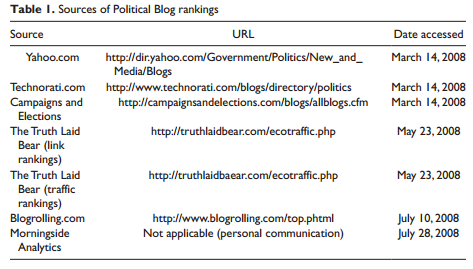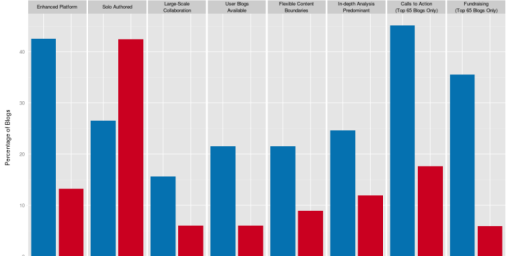Two Blogospheres, Dated Research
Aaron Shaw and Yochai Benkler have an article in the current issue of American Behavioral Scientist titled "A Tale of Two Blogospheres : Discursive Practices on the Left and Right."
Aaron Shaw and Yochai Benkler have an article in the current issue of American Behavioral Scientist titled “A Tale of Two Blogospheres : Discursive Practices on the Left and Right.” The abstract informs us,
In this article, the authors compare the practices of discursive production among top U.S. political blogs on the left and right during summer 2008. An examination of the top 155 political blogs reveals significant cross-ideological variations along several dimensions. Notably, the authors find evidence of an association between ideological affiliation and the technologies, institutions, and practices of participation. Blogs on the left adopt different, and more participatory, technical platforms, comprise significantly fewer sole-authored sites, include user blogs, maintain more fluid boundaries between secondary and primary content, include longer narrative and discussion posts, and (among the top half of the blogs in the sample) more often use blogs as platforms for mobilization. The findings suggest that the attenuation of the news producer-consumer dichotomy is more pronounced on the left wing of the political blogosphere than on the right. The practices of the left are more consistent with the prediction that the networked public sphere offers new pathways for discursive participation by a wider array of individuals, whereas the practices of the right suggest that a small group of elites may retain more exclusive agenda-setting authority online. The cross-ideological divergence in the findings illustrates that the Internet can be adopted equally to undermine or to replicate the traditional distinction between the production and consumption of political information. The authors conclude that these findings have significant implications for the study of prosumption and for the mechanisms by which the networked public sphere may or may not alter democratic participation relative to the mass mediated public sphere.
The full article is available in PDF format but the findings are consistent with most formal and informal studies of the blogosphere over the years.
What’s odd about this particular study, though, is that the data is four years old. Presumably, the authors tried and failed to get this published in a plethora of sources before finally getting accepted in this journal, which probably has a backlog. Regardless, blogs are a relatively new phenomenon and lopping off the most recent four years of it greatly diminishes the value of the findings.
Additionally, I had to laugh at the source selections for the coding:
Even in 2008, TTLB and Technorati were viewed as jokes. The proprietor of the former had long moved on to other projects, tired of his ranking system being gamed and of dealing with the enormous technical problems of surveying such a vast field. I don’t know what happened to Technorati but bloggers long ago stopped paying any attention to it.
via Tyler Cowen








And Blogrolling doesn’t even exist anymore as a functioning web site
hmmm. m
More participatory …. do they mean to say more group-think, which of course is best described as non-thinking?
yeah, i guess that works.
I believe that Technorati was the first site to record and correlate cross-blog linkages. They had a great technological lead. If I remember correctly, the first Technorati incarnation was a stark data oriented interface. I think they lost their way though when they tried to build a business model and appeal to people beyond “data fiends.”
Oh right, Technorati was the only place to go, in the beginning, for a total blog count. Here is a quote I snagged on 1/27/2005:
I see from my notes that they had 7,789,086 weblogs recorded on 3/11/2005 and 9,295,994 on 4/28/2005. On that later date they also claimed “1,079,309,499 links tracked.”
So all in all a great engineering effort … but one that lot its way. At some point Memeorandum cleaned their clock, probably just with a cleaner representation of …. possibly less complete data.
I haven’t read the study, yet. Do the authors offer a hypothesis about why the two sides are different?
My own hypothesis is that the difference is a function of where each side is in the movement and political cycles. The Right’s movement had been around longer, and the Left’s new progressive movement had developed in a very different political context than the Right had over the previous 7-8 years.
I find many people tend to ascribe the differences in media environments to intrinsic differences between people on the Right and Left, but they are mostly just assuming their biases are reality. I wonder if they make that mistake in this case.
Incidentally, it’s ironic that, as you say, Memeorandum cleaned their clock, because the guy who runs it basically does nothing with it. It was built, set on auto-pilot and left to run on its own for years. That’s a testament to great architecture.
I guess that should have been “Bloggers [are] people who” Heh, back when they had to explain it.
FWIW, Felix Salmon made the audacious claim this week that Twitter has killed the blog. This as he continues to blog, or to link out to “single page” sites for longer messages.
It might be true though in a sense, from the reader side. I’ve got a pretty good setup in Google Reader, with RSS, but you’ve got to be a little techie to do that. Sometimes you’ve got to hunt down RSS feeds on a site you want to track. Twitter’s main strength is that it’s easy. You just start following, then adding, etc.
@Jon Henke:
My observation is that right and left have a different social binding. The right connects pretty much just for politics, whereas the left is more social and lifestyle oriented.
This opinion was crystallized when the local Dems and Repubs both thought I was one of them. The Republicans kept asking for money, and the Democrats kept inviting me to wine and cheese parties.
But still we see it in the popular left/environmental sites like Grist or Treehugger. They are about a responsible and happy way to live … while the poor Republicans still take refuge in “super-size is freedom!”
@Eric Florack: Yes, there’s much more individual thinking on sites such as Bitsblog, where readers passively absorb statement such as “Obama is little more than a house [n**ger] without feedback. The intellectual diversity is astounding.
Not all that surprising that the data is that out-of-date. I’m still trying to get results from a survey from over three years ago published (funnily enough, though, it’s probably more relevant now than it was when we first tried to send it out).
Besides, at least now the authors have an easy followup study to do.
I don’t know what happened to Technorati but bloggers long ago stopped paying any attention to it.
Technorati does something where its site links to just about everything I write, so when I look through my “most recent links” it’s all Technorati material (like this) Anyway, it’s made my “most recent links” functionally useless. Every now and again someone on Technorati wrote about something interesting, though.
This doesn’t have a whole lot to do with their rating system. I think they’ve given up on that.